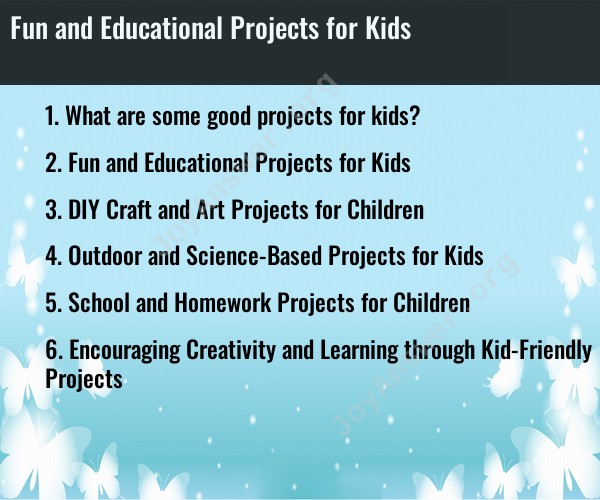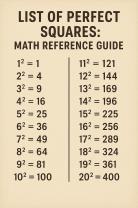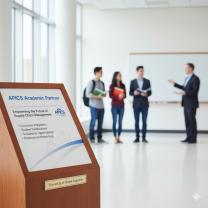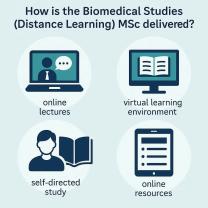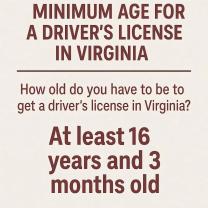What are some good projects for kids?
Engaging in fun and educational projects is a great way for kids to learn, explore their creativity, and develop important skills. Here are some good project ideas for kids that cover a range of interests and age groups:
DIY Science Experiments:
- Create simple science experiments at home, such as making a volcano with baking soda and vinegar, growing crystals, or testing the buoyancy of different objects.
Nature Scavenger Hunt:
- Go on a nature scavenger hunt to explore the outdoors and learn about local plants, animals, and natural features.
Gardening:
- Plant a small garden or grow herbs in pots. Kids can learn about plant growth, caring for plants, and the importance of nature.
Arts and Crafts:
- Encourage artistic expression through painting, drawing, making friendship bracelets, or constructing paper mache sculptures.
Cooking and Baking:
- Get kids involved in the kitchen by cooking simple meals or baking cookies and cupcakes. They can learn about measurements and the science of cooking.
Storytelling and Writing:
- Have kids write and illustrate their own stories or create a family newspaper. This fosters creativity and writing skills.
Building with LEGO or Blocks:
- Building projects with LEGO, wooden blocks, or other construction toys can help develop fine motor skills and problem-solving abilities.
Science Kits:
- Invest in age-appropriate science kits that allow kids to conduct experiments in a guided and hands-on way.
Learn a Musical Instrument:
- Introduce kids to playing musical instruments like the piano, guitar, or a simple recorder. Music is a creative and educational outlet.
Coding and Programming:
- Teach kids the basics of coding and programming through online platforms or coding games, which help develop logical thinking and problem-solving skills.
DIY Board Games:
- Encourage kids to create their own board games with rules, cards, and game pieces. This can enhance critical thinking and creativity.
Sewing and Needlework:
- Learn simple sewing skills to create basic clothing items, pillows, or stuffed animals.
DIY Science Kits:
- Assemble DIY science kits that cover topics like growing crystals, creating slime, or building simple robots.
Outdoor Science Observations:
- Take nature walks and make observations about the environment, wildlife, and weather. Keep a nature journal.
Puzzle Challenges:
- Solve jigsaw puzzles, crosswords, or Sudoku puzzles to boost problem-solving abilities.
Geography and Map Projects:
- Explore geography by creating your own maps, learning about different countries, and even attempting to build a model of the Earth.
DIY Home Decor:
- Make decorative items like painted plant pots, personalized photo frames, or decorative candles.
Community Service Projects:
- Engage in community service or volunteering projects to teach kids about empathy, kindness, and giving back.
Recycled Art:
- Create art using recycled materials like cardboard, plastic bottles, or old magazines. This teaches environmental awareness and creativity.
Building a Model:
- Build scale models of famous landmarks, airplanes, or historical structures. This can be both educational and fun.
When selecting projects for kids, consider their interests, age, and abilities. Encourage them to take ownership of their projects, make decisions, and problem-solve, as these skills are valuable for their development. Additionally, ensure that the projects are safe and supervised as needed, and don't forget to have fun along the way!
Fun and Educational Projects for Kids
Engaging kids in creative and educational projects can spark their curiosity, foster a love for learning, and provide opportunities for hands-on exploration. Here are some fun and educational project ideas for kids of different ages:
DIY Craft and Art Projects for Children
DIY Puppets: Create puppets using socks, paper bags, or other materials, encouraging storytelling and imaginative play.
Paper Crafts: Engage kids in origami, paper folding, or paper cutting activities to develop fine motor skills and creativity.
Jewelry Making: Make personalized necklaces, bracelets, or keychains using beads, yarn, or other craft materials.
Nature Crafts: Collect natural materials like leaves, twigs, and rocks to create unique art pieces, fostering an appreciation for nature.
DIY Cards and Decorations: Design and create personalized cards, decorations, or gift tags for special occasions.
Outdoor and Science-Based Projects for Kids
Nature Scavenger Hunts: Create a list of items to find in a park, backyard, or nature trail, encouraging observation and exploration.
Build a Bird Feeder: Construct a bird feeder using recycled materials and observe the different bird species that visit.
Plant a Garden: Grow a small garden of flowers, vegetables, or herbs, teaching kids about plant life and nutrition.
Conduct Science Experiments: Perform simple science experiments like making slime, creating a volcano, or exploring color mixing.
Stargazing: Observe the night sky with binoculars or a telescope, introducing kids to astronomy and the wonders of the universe.
4. School and Homework Projects
Create a Diorama: Construct a diorama depicting a historical event, a scientific concept, or a fictional story.
Make a Presentation: Research a topic of interest and present it in a creative and engaging way using visuals and props.
Write a Story or Poem: Encourage kids to express their creativity through writing short stories, poems, or scripts.
Design a Board Game: Create a board game with a unique theme, rules, and playing pieces.
Build a Model: Construct a model of a famous building, a historical monument, or a scientific object.
Encouraging Creativity and Learning through Kid-Friendly Projects
Provide Open-Ended Activities: Encourage kids to explore and experiment with different materials and techniques without strict guidelines.
Embrace Mistakes as Learning Opportunities: View mistakes as part of the learning process and encourage kids to try new things without fear of failure.
Make Learning Fun and Engaging: Incorporate elements of play, games, and hands-on activities to make learning more enjoyable.
Support and Encourage Exploration: Provide guidance and support while allowing kids to explore their own interests and ideas.
Celebrate Creativity and Accomplishments: Acknowledge and celebrate kids' creativity and achievements, fostering a sense of pride and self-confidence.
